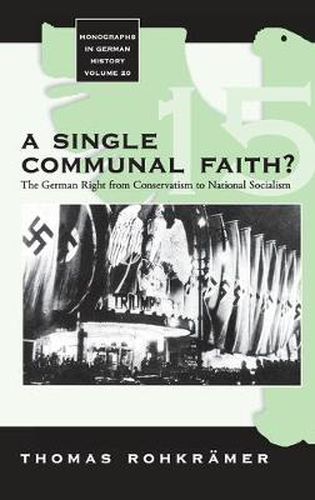Readings Newsletter
Become a Readings Member to make your shopping experience even easier.
Sign in or sign up for free!
You’re not far away from qualifying for FREE standard shipping within Australia
You’ve qualified for FREE standard shipping within Australia
The cart is loading…






How could the Right transform itself from a politics of the nobility to a fatally attractive option for people from all parts of society? How could the Nazis gain a good third of the votes in free elections and remain popular far into their rule? A number of studies from the 1960s have dealt with the issue, in particular the works by George Mosse and Fritz Stern. Their central arguments are still challenging, but a large number of more specific studies allow today for a much more complex argument, which also takes account of changes in our understanding of German history in general. This book shows that between 1800 and 1945 the fundamentalist desire for a single communal faith played a crucial role in the radicalization of Germany’s political Right. A nationalist faith could gain wider appeal, because people were searching for a sense of identity and belonging, a mental map for the modern world and metaphysical security.
$9.00 standard shipping within Australia
FREE standard shipping within Australia for orders over $100.00
Express & International shipping calculated at checkout
How could the Right transform itself from a politics of the nobility to a fatally attractive option for people from all parts of society? How could the Nazis gain a good third of the votes in free elections and remain popular far into their rule? A number of studies from the 1960s have dealt with the issue, in particular the works by George Mosse and Fritz Stern. Their central arguments are still challenging, but a large number of more specific studies allow today for a much more complex argument, which also takes account of changes in our understanding of German history in general. This book shows that between 1800 and 1945 the fundamentalist desire for a single communal faith played a crucial role in the radicalization of Germany’s political Right. A nationalist faith could gain wider appeal, because people were searching for a sense of identity and belonging, a mental map for the modern world and metaphysical security.